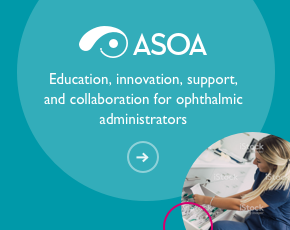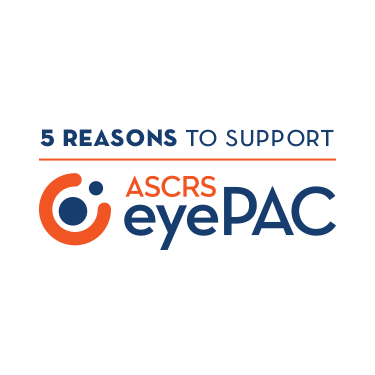


Celebrating trailblazers, innovators, and educators in ophthalmology
Jump to section




Fifty years ago, patients waited until cataracts were debilitating before committing to surgery. The options for visual rehabilitation postop were also subpar. Then came intraocular lenses, an implant that could allow patients to see without heavy “Coke bottle” glasses or uncomfortable hard contact lenses. Discussion about IOLs among ophthalmologists was incredibly tense, and adoption by many was frowned upon.
You don’t put a foreign body in the eye. I’m not going to allow you to write an article about it and publish it in our journal. That was the world of 1974.Kenneth J. Hoffer, MD, AIOIS Founder and 1974–1975 AIOIS President

Kenneth J. Hoffer, MD, started the American Intra-Ocular Implant Society (AIOIS), incorporating it on August 28, 1974, to be a welcome space for the discussion, education, and advancement of IOLs. The founding executive officers were Dr. Hoffer, John Darin, MD, Jeremy Levenson, MD, and Steve Cooperman, MD. In addition, a group of 13 ophthalmologists comprised the Scientific Advisory Board. Within the year, AIOIS had 300 members.




Under David Karcher, who became executive director of the Society in 1981 and held the role for 37 years, membership increased and involvement opportunities expanded. In the early 1980s, membership grew to 3,600. Mr. Karcher with Lucy Santiago also helped found the American Society of Ophthalmic Administrators (ASOA) in 1986; ASOA remains a partner of ASCRS.

In 1985, the name of the Society changed from the American Intra-Ocular Implant Society to the American Society of Cataract and Refractive Surgery. The change was significant, for refractive lens-based and corneal refractive surgery was on the rise, and it emphasized that the Society advocated for surgeons and surgery.
We went from 1,800 members to 2,200 members within 30 days. Within 60 days, we doubled our membership; we went to 3,600 members.David Karcher, ASCRS Executive Director, 1981–2017

In the 1990s and 2000s, ASCRS added resources for education in more clinical areas, formally developed its advocacy efforts, and created a philanthropic arm. The Annual Meeting continued to be one of the most valuable aspects of the Society, known for its "culture of innovation,” and the welcoming, open-minded spirit of the Society continued.
The meeting experience is still a core piece in the interaction with our colleagues.Douglas Koch, MD, 2001–2002 ASCRS President

Marguerite McDonald, MD, performed the world’s first laser vision correction procedure on a human eye. Stephen Trokel, MD, Charles Munnerlyn, PhD, Stephen Klyce, PhD, and Dr. McDonald were part of the development team behind the procedure, which was considered very controversial at the time. ASCRS has been supportive of advances in laser vision correction, including defending LASIK in an FDA hearing in 2008.

Marguerite McDonald, MD, served as the first female president of ASCRS from 2002–2003. Following Dr. McDonald were Priscilla Arnold, MD, 2004–2005, Bonnie Henderson, MD, 2017–2018, and Elizabeth Yeu, MD, 2023–2024. “At the time that was very controversial,” Dr. McDonald said of becoming the Society’s president, adding later “it’s wonderful to have seen the evolution."
We engage ophthalmologists in grassroots efforts and partner with like-minded surgical and specialty coalitions, as well as encouraging ASCRS members to develop relationships with their members of Congress, focusing on those members of Congress serving on key healthcare-related committees with jurisdiction over Medicare.Nancey McCann, former ASCRS Director of Government Relations




ASCRS has continued to expand its educational opportunities through the years. In 2001, the Cornea Clinical Committee was added, coinciding with new developments in the cornea field. ASCRS now has Subspecialty Day programming focusing on cornea, glaucoma, and refractive surgery. Through the years, ASCRS has also been proactive on timely and important issues, ensuring that members have the information that they need to serve their patients, such as forming the TASS Task Force in 2006 and featuring the ASCRS Post-Refractive Calculator as a tool on its website in 2007.

In 2018, Steve Speares took over for David Karcher as ASCRS Executive Director. Mr. Speares had a long history in the ophthalmic field prior to taking the reins at ASCRS. Having previously attended the ASCRS Annual Meeting on numerous occasions while working for various ophthalmic companies, Mr. Speares was very aware of the value of the Society and its meeting. He’s particularly proud of how the Society has evolved, stayed on the forefront of ophthalmology through the years, and has continued to place an emphasis on the meritocratic leadership structure.
In 2019 I gave a talk about what ASCRS looks like today, what it will look like tomorrow, and what it will look like in the future. [We will strive to] stay true to our stated purpose and make certain that we provide the best education, the best advocacy, the best philanthropy that we can with the surgeons leading us.Steve Speares, ASCRS Executive Director



I think that what we went through [in the pandemic] strengthened my love for the Society and my admiration of our practices. To be a medical practice that’s shut down for weeks—I just can’t imagine when you’ve got patients who are in need who can’t see you or are afraid to see you.Steve Speares, ASCRS Executive Director

ASCRS is fortunate to have many committed members and leadership who help drive the Society. ASCRS values the many founders, and physician leaders have remained committed to the Society and its mission over the years. ASCRS also takes pride in being a meritocracy and having many members of different backgrounds involved. A more recent focus has also been on developing the next generation. The YES Clinical Committee helps facilitate opportunities for younger surgeons to get involved with ASCRS.
For 50 years, ASCRS has supported surgeons through some trying times and has championed their triumphs. The next 50 years will not be without challenges, but with the backing of its members and by never losing its innovative spirit, ASCRS will continue to advance the education, advocacy, and philanthropy of anterior segment surgery.


